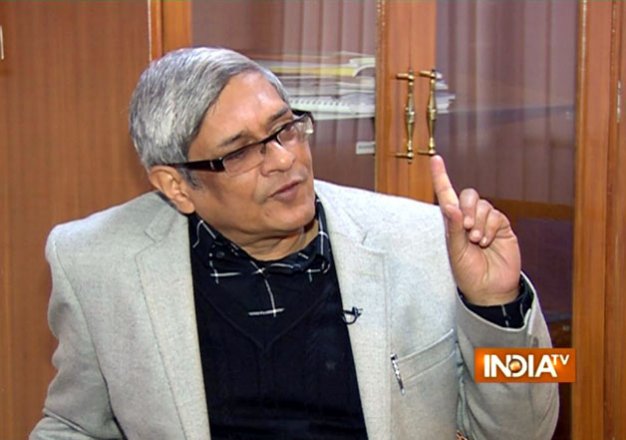NITI Aayog vs Planning Commission
Q: What necessitated Planning Commission to be replaced with NITI Aayog? In last one year, what are the major achievements for NITI Aayog.
Bibek Debroy: Firstly, NITI Aayog was not formed in May 2014. It was formed on January 1, 2015. So NITI Aayog was formed a bit after the rest of the government.
Second, NITI Aayog does not start to function simply because you have got a vice-chairman and 3 members. You need to have staff below that. From Planning Commission, we inherited about 600 odd positions. This was meant to be a leaner organisation so the number of positions was reduced to be about 600 out of which roughly 400 are in place. It means we still need to recruit people, get people from outside which we are in the process of doing.
The big shift that has happened is that earlier states had to come to Planning Commission; they were summoned to the Planning Commission. Part of it because of the annual plan discussions, part of it because the money, the plan expenditure, was routed through the Planning Commission and part of it because of the centrally sponsored schemes for which the templates were devised here.
One of the conscious changes that have happened is that the NITI Aayog is no longer deciding or dictating unlike the old Planning Commission. Chief Ministers are not summoned to the NITI Aayog. We go to the states; we go to the Chief Ministers.
Take the example of the centrally sponsored schemes, it would have been very easy for central government ministries, departments and agencies to decide what these centrally sponsored schemes should be. Instead, a sub-group of Chief Ministers was set up to decide on these centrally sponsored schemes.
Similarly, there was a sub-group of Chief Ministers on Swachha Bharat mission and skill development. This is a very-very important institutional change that has happened, the change of cooperative federalism. This is the first difference.
The second difference is that we are much more concerned with actual delivery than the original Planning Commission was. It was in terms of the mandate of the Planning Commission which was set up in 1950 but that was not what Planning Commission was doing.
So, we are much more involved with delivery, we are much more involved with solving problems that state governments have with the ministries here. There are several instances where we have intervened to solve physical infrastructure problems of projects being stuck, particularly in North-East. We are much more involved with examining the delivery of public expenditure schemes in social sectors.
The Planning Commission was largely obsessed with the cycle of Five-Year plans. The Planning Commission made projections which became very unrealistic. We are much more concerned with Planning ‘bottom-up' i.e. from below.
Q: The idea does not seem to have gone down well with Congress Chief Ministers. Many of them are said to be reluctant to attend NITI Aayog meetings?
Bibek Debroy: That is actually not true. There was only one particular meeting relating to land bill that Congress Chief Ministers did not come to. If I look to all other meetings, there is only one Chief Minister who has so far not come to NITI Aayog meetings and that is the Chief Minister of West Bengal.
Actually, most Chief Ministers began to ask questions that you are asking today – what is the difference between NITI Aayog and the old Planning Commission and most of them were distrustful of the old Planning Commission. Once, the comfort level was attained then it has nothing to do with political configurations.
Communication challenge for Modi government
Bibek Debroy: There are several instances where this government has introduced reforms but that message is not getting disseminated. I'll give you one or two examples of that. There is a difference between saying that the government is not doing things and that the government is doing things but not disseminating adequately. The problem is more with the latter than the former.
For example, I have been asked, Mr Modi in the course of his campaign speeches, said he will repeal all the old laws. They asked, what has happened? And that the government is not doing anything. The fact of the matter is that most people do not know that about 500 old laws have already been repealed and there is another bill that will repeal another 200 laws. This is not the secret information. This is on the website of Ministry of Law. You can legitimately tell me why is the Law Ministry not disseminating it better?
Similarly, People keep asking me, what has happened to your Railways report. I have to sit down and explain, item-by-item, what the Railway ministry has done in last three months. Again, it's a dissemination issue.
I think there is a strong dissemination issue cutting across most ministries which are not disseminating what they have been doing and it includes Smart City project as well.
Q: So who is responsible for this? Why is the government not succeeding in communicating the message? Is there any problem at the PMO level?
Bibek Debroy: I don't think it's a problem at the PMO level. That is a broader issue.
You see, it's very difficult for me to criticise the rest of the government when at NITI Aayog, we have been very bad at disseminating what we have been doing. I am constantly asked whenever I meet someone, what is NITI Aayog? What does it do? And it's a very unsatisfactory reply to say that please visit our website, all we have been doing is up there.
Clearly, we are also falling short in disseminating. At least, we have recognised that we have made a mistake, so we are trying to make amends. And I think, the other ministries will also do that.

